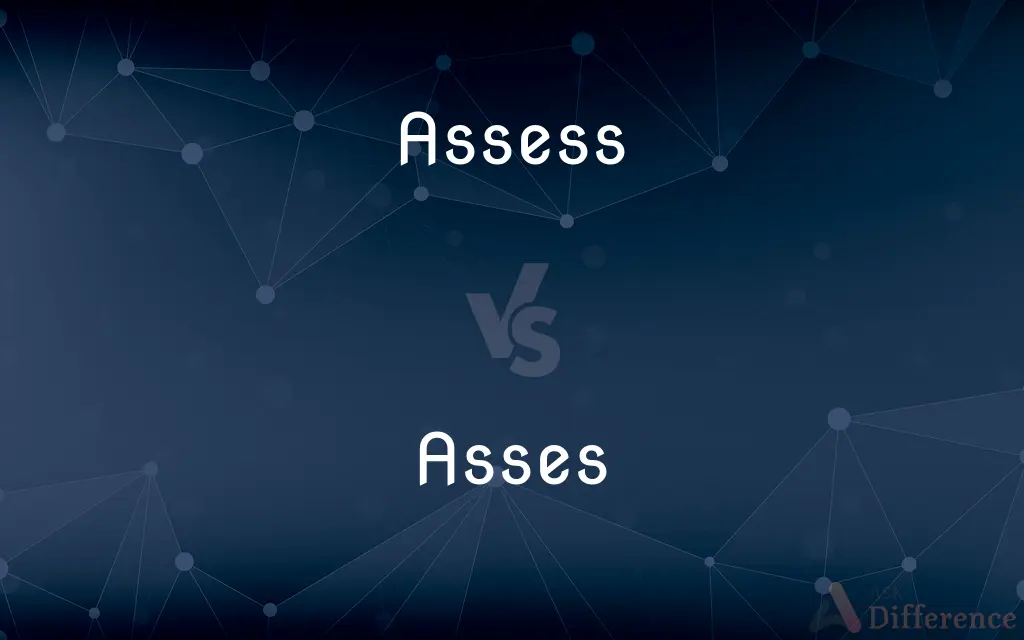Assess vs. Asses — What's the Difference?
By Tayyaba Rehman — Updated on November 2, 2023
Assess means to evaluate or estimate, while Asses is the plural form of Ass, a type of equine animal.

Difference Between Assess and Asses
Table of Contents
ADVERTISEMENT
Key Differences
Assess is a verb commonly used in the context of evaluating or estimating the nature, ability, or quality of something or someone. For instance, teachers assess students' skills to determine their grasp of the subject matter. On the other hand, Asses refers to the plural form of the noun 'Ass', which is a hoofed mammal closely related to the horse. While Assess has a more intellectual connotation linked to judgement or evaluation, Asses is purely an animal reference.
The act of assessing might involve understanding, analyzing, and then forming an opinion about a certain topic or issue. On the contrary, Asses does not involve any such process and directly points to a group of donkey-like animals.
It's crucial not to confuse Assess with Asses in written or verbal communication. Misusing Assess when referring to the animal might lead to confusion, and using Asses when the intention is to evaluate can result in misunderstandings.
A teacher may assess the progress of a student, considering various factors like test scores, participation, and overall growth. In a completely different context, farmers might have several Asses to help with transportation or labor in some regions.
Comparison Chart
Part of Speech
Verb
Noun
ADVERTISEMENT
Meaning
To evaluate or estimate
Plural of Ass, an equine animal
Usage in Sentence
"I need to assess the situation."
"He owns two asses on his farm."
Common Context
Evaluation, Judgement
Animal, Farming
Derived From
Latin 'assidere' meaning to sit beside
Old English 'ass', which referred to the animal
Compare with Definitions
Assess
To evaluate or appraise.
Teachers will assess the students' projects.
Asses
Used colloquially to refer to a foolish or stupid person.
They acted like total asses at the party.
Assess
To determine the importance or size of something.
We need to assess the risk before investing.
Asses
Plural form of Ass, a hoofed animal.
The farmer has three asses in his barn.
Assess
To impose a tax or fine.
The city will assess a penalty for late payments.
Asses
Any of several hoofed mammals of the genus Equus, resembling and closely related to the horses but having a smaller build and longer ears, and including the domesticated donkey.
Assess
To determine the value, significance, or extent of; appraise.
Asses
A foolish or stupid person.
Assess
To estimate the value of (property) for taxation.
Asses
An ancient Roman coin of copper or copper alloy.
Assess
To set or determine the amount of (a payment, such as a tax or fine).
Asses
An ancient Roman unit of weight equal to about one troy pound.
Assess
To charge (a person or property) with a special payment, such as a tax or fine.
Asses
Used in combination with adjectives as an intensive
I don't want to play your dumb-ass game. That is one crazy-ass idea.
Assess
(Sports) To charge (a player, coach, or team) with a foul or penalty.
Asses
Plural of ass
Assess
(transitive) To determine, estimate or judge the value of; to evaluate
He assessed the situation.
Assess
(transitive) To impose or charge, especially as punishment for an infraction.
The referee assessed a penalty for delaying the game.
A $10.00 late fee will be assessed on all overdue accounts.
Assess
(transitive) To calculate and demand (the tax money due) from a person or entity.
Once you've submitted a tax return, the Tax Department will assess the amount of tax you still owe.
Assess
To value; to make a valuation or official estimate of for the purpose of taxation.
Assess
To apportion a sum to be paid by (a person, a community, or an estate), in the nature of a tax, fine, etc.; to impose a tax upon (a person, an estate, or an income) according to a rate or apportionment.
Assess
To determine and impose a tax or fine upon (a person, community, estate, or income); to tax; as, the club assessed each member twenty-five cents.
Assess
To fix or determine the rate or amount of.
This sum is assessed and raised upon individuals by commissioners in the act.
Assess
Place a value on; judge the worth of something;
I will have the family jewels appraised by a professional
Assess
Charge (a person or a property) with a payment, such as a tax or a fine
Assess
Set or determine the amount of (a payment such as a fine)
Assess
Estimate the value of (property) for taxation;
Our house hasn't been assessed in years
Assess
To estimate the value of property, especially for tax purposes.
The county will assess the property at $250,000.
Assess
To charge someone with a specific fee.
The club will assess members an annual fee.
Common Curiosities
What does Asses refer to?
Asses is the plural form of Ass, which refers to a type of equine animal.
Is Asses used to describe multiple donkeys?
Yes, Asses is the plural form and can describe multiple donkeys.
Are Asses found in the wild?
Yes, some species of asses, like the African wild ass, are found in the wild.
Is Assess a verb or a noun?
Assess is primarily used as a verb meaning to evaluate or estimate.
What's the risk of confusing Assess with Asses in a sentence?
Misusing them can lead to misunderstandings given their completely different meanings.
Is the term Asses used colloquially in any other context?
Colloquially, "asses" can sometimes refer to foolish or silly individuals.
Can Assess be used in a business context?
Absolutely, businesses often assess risks, opportunities, or market trends.
Can Assess be used in a financial context?
Yes, it can refer to imposing a tax or estimating property value.
Can I use Assess to describe understanding a concept?
Yes, to assess can also mean to understand or grasp a concept.
How is Assess typically used in an academic context?
In academia, to assess usually refers to evaluating a student's performance or understanding.
Do Asses have a cultural significance?
Yes, in many cultures, asses are symbols of hard work, endurance, or humility.
Can Asses be used to describe mules?
No, mules are a hybrid of horses and asses but are distinct from asses.
Are Asses domesticated animals?
Yes, they have been domesticated for thousands of years for work and transportation.
Does Assess have a Latin origin?
Yes, it's derived from the Latin word 'assidere' meaning to sit beside.
What is the main purpose of assessing something?
The main purpose is to evaluate, understand, and form an opinion or value judgement.
Share Your Discovery

Previous Comparison
Procedure vs. Methodology
Next Comparison
Perceptual vs. ConceptualAuthor Spotlight
Written by
Tayyaba RehmanTayyaba Rehman is a distinguished writer, currently serving as a primary contributor to askdifference.com. As a researcher in semantics and etymology, Tayyaba's passion for the complexity of languages and their distinctions has found a perfect home on the platform. Tayyaba delves into the intricacies of language, distinguishing between commonly confused words and phrases, thereby providing clarity for readers worldwide.















































